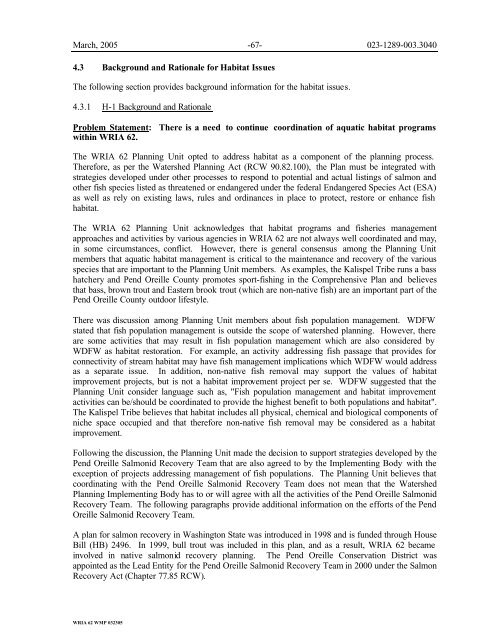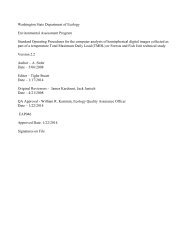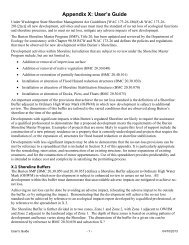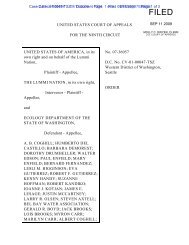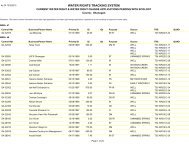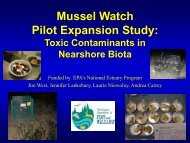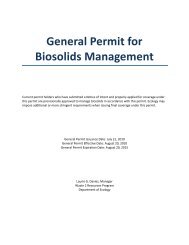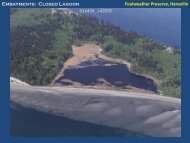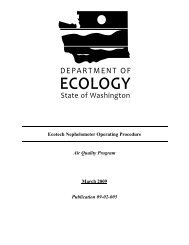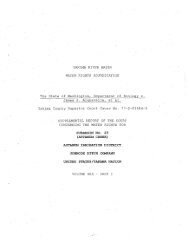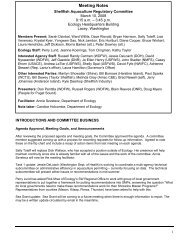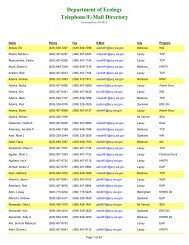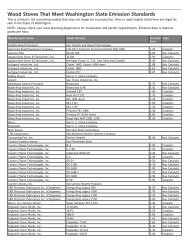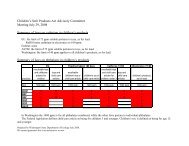WRIA 62 WMP 032305 - Washington State Department of Ecology
WRIA 62 WMP 032305 - Washington State Department of Ecology
WRIA 62 WMP 032305 - Washington State Department of Ecology
Create successful ePaper yourself
Turn your PDF publications into a flip-book with our unique Google optimized e-Paper software.
March, 2005 -67- 023-1289-003.3040<br />
4.3 Background and Rationale for Habitat Issues<br />
The following section provides background information for the habitat issues.<br />
4.3.1 H-1 Background and Rationale<br />
Problem <strong>State</strong>ment: There is a need to continue coordination <strong>of</strong> aquatic habitat programs<br />
within <strong>WRIA</strong> <strong>62</strong>.<br />
The <strong>WRIA</strong> <strong>62</strong> Planning Unit opted to address habitat as a component <strong>of</strong> the planning process.<br />
Therefore, as per the Watershed Planning Act (RCW 90.82.100), the Plan must be integrated with<br />
strategies developed under other processes to respond to potential and actual listings <strong>of</strong> salmon and<br />
other fish species listed as threatened or endangered under the federal Endangered Species Act (ESA)<br />
as well as rely on existing laws, rules and ordinances in place to protect, restore or enhance fish<br />
habitat.<br />
The <strong>WRIA</strong> <strong>62</strong> Planning Unit acknowledges that habitat programs and fisheries management<br />
approaches and activities by various agencies in <strong>WRIA</strong> <strong>62</strong> are not always well coordinated and may,<br />
in some circumstances, conflict. However, there is general consensus among the Planning Unit<br />
members that aquatic habitat management is critical to the maintenance and recovery <strong>of</strong> the various<br />
species that are important to the Planning Unit members. As examples, the Kalispel Tribe runs a bass<br />
hatchery and Pend Oreille County promotes sport-fishing in the Comprehensive Plan and believes<br />
that bass, brown trout and Eastern brook trout (which are non-native fish) are an important part <strong>of</strong> the<br />
Pend Oreille County outdoor lifestyle.<br />
There was discussion among Planning Unit members about fish population management. WDFW<br />
stated that fish population management is outside the scope <strong>of</strong> watershed planning. However, there<br />
are some activities that may result in fish population management which are also considered by<br />
WDFW as habitat restoration. For example, an activity addressing fish passage that provides for<br />
connectivity <strong>of</strong> stream habitat may have fish management implications which WDFW would address<br />
as a separate issue. In addition, non-native fish removal may support the values <strong>of</strong> habitat<br />
improvement projects, but is not a habitat improvement project per se. WDFW suggested that the<br />
Planning Unit consider language such as, "Fish population management and habitat improvement<br />
activities can be/should be coordinated to provide the highest benefit to both populations and habitat".<br />
The Kalispel Tribe believes that habitat includes all physical, chemical and biological components <strong>of</strong><br />
niche space occupied and that therefore non-native fish removal may be considered as a habitat<br />
improvement.<br />
Following the discussion, the Planning Unit made the decision to support strategies developed by the<br />
Pend Oreille Salmonid Recovery Team that are also agreed to by the Implementing Body with the<br />
exception <strong>of</strong> projects addressing management <strong>of</strong> fish populations. The Planning Unit believes that<br />
coordinating with the Pend Oreille Salmonid Recovery Team does not mean that the Watershed<br />
Planning Implementing Body has to or will agree with all the activities <strong>of</strong> the Pend Oreille Salmonid<br />
Recovery Team. The following paragraphs provide additional information on the efforts <strong>of</strong> the Pend<br />
Oreille Salmonid Recovery Team.<br />
A plan for salmon recovery in <strong>Washington</strong> <strong>State</strong> was introduced in 1998 and is funded through House<br />
Bill (HB) 2496. In 1999, bull trout was included in this plan, and as a result, <strong>WRIA</strong> <strong>62</strong> became<br />
involved in native salmonid recovery planning. The Pend Oreille Conservation District was<br />
appointed as the Lead Entity for the Pend Oreille Salmonid Recovery Team in 2000 under the Salmon<br />
Recovery Act (Chapter 77.85 RCW).<br />
<strong>WRIA</strong> <strong>62</strong> <strong>WMP</strong> <strong>032305</strong>


